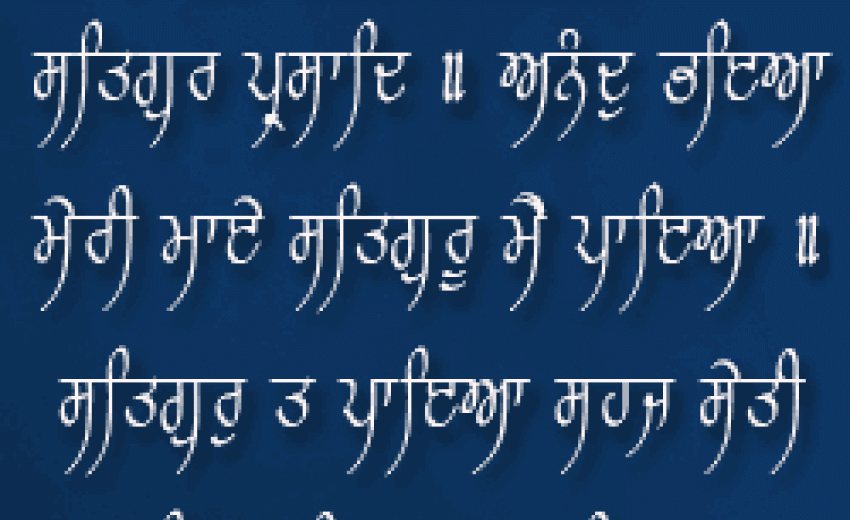
Anand means bliss and is the blessed evenness which one experiences inside one's own heart. It may be when relaxing in the shade on a summer's day, or smiling with delight in the company of great friends, the irrepressible bliss of life is revealed. Bliss may be outward smiling and laughter, but is also a quiet sense of calm and gentleness inside. Bliss is the quality of the foundation of your life's essence. Like waves arise from the fluidity of the ocean, our thoughts and feelings arise from bliss. Just like waves in the ocean rise and fall, so do waves in our mind and body. To meditate is to recognize and connect with this depth of bliss within us. Then to live daily life remembering this anand is wisdom.

Everyone wants to enjoy his life. Some enjoy through living in family, some by earning wealth, some try to find in sex, some in drinking and taking to drugs, and others -by playing, singing or dancing. But this all is momentary; all is temporary; temporary enjoyment for the moment you are doing a particular action; does not remain enjoyable for ever after its continuity. Relationships in family get soured; wealth, wine, sex, drugs do not remain attracting; playing, singing or dancing cannot be done for longer periods as one gets tired and prolonged practice causes pain. Life is full of suffering, yet for those who are caught in the temporal world; it is possible to experience anand, happiness and bliss. Bliss is infinite happiness. It is the fundamental desire of human beings. "There is in the living being a thirst for limitlessness." We can never be satisfied with limited things. They may give us pleasure for a while, but not long-lasting satisfaction. A limited object can only give a temporary and limited amount of happiness. But only infinite happiness will satisfy us. So how are we to attain it? By expanding our awareness to infinity; by transforming our individual limited experience into the cosmic experience of the unlimited: infinite happiness; perfect peace and contentment - bliss. How can one be in a blissful state forever? In Sri Guru Granth Sahib its beautiful description is found in the stanzas on 'Anand' meaning bliss. What is bliss? How one attains it? How does one maintain it? These are some of the questions attempted to be answered here
What is Bliss?
Bliss or Anand can be defined as perfect happiness; feelings of enjoyment, pleasure, and satisfaction1 extreme happiness; ecstasy; the ecstasy of salvation; spiritual joy2. Literally 'a:' means from all sides and 'nand' means happiness or joy. Thus literally 'anand' means joy from all sides. Bliss is so vast, boundless, and immeasurable that it encompasses every possible word or definition ever invented. This is, of course, why we continue to stress that bliss must be personally experienced, not just discussed.
Some synonyms for bliss are ánand, sukh, and santosh. They can be used for any type of bliss. Anand differs from sukh (happiness). We all are of the nature of bliss. Our nature is one of immortal bliss. This so-called happiness is only a faint reflection, a little spark of the brilliant sun of bliss which is hidden within. This is only a shadow of that eternal bliss that is waiting to be exposed. Our so-called happiness and misery now, are nothing but different states of mind. In Sri Guru Granth Sahib it is used as anand, paramanad and maha anand; also related to binod, mangal, ullas, sukh, param sukh, chao etc, and translated in English as bliss, eternal bliss, supreme bliss, joy, ecstasy, serenity, peace etc.
1. ਅਨੰਦੁ ਭਇਆ ਮੇਰੀ ਮਾਏ ਸਤਿਗੁਰੂ ਮੈ ਪਾਇਆ ॥ ਮਃ 3, ਪੰਨਾ 917, ਸਤਰ 2
I am in ecstasy, O my mother, for I have found my True Guru.
2. ਤਹ ਸਦਾ ਅਨੰਦ ਅਨਹਤ ਆਖਾਰੇ ॥ ਮਃ 5, ਪੰਨਾ 237, ਸਤਰ 15
There is eternal bliss, and the unstruck celestial music there
3. ਅਨੰਦ ਬਿਨੋਦ ਮੰਗਲ ਗੁਣ ਗਾਵਹੁ ਗੁਰ ਨਾਨਕ ਭਏ ਦਇਆਲਾ ॥ ਮਃ 5, ਪੰਨਾ 619, ਸਤਰ 15
Sing the Glorious Praises of the Lord in bliss, joy and ecstasy; Nanak says the True Guru has
become kind and compassionate.
4. ਮਹਾ ਅਨੰਦ ਕਰੇ ਸਦ ਕੇਲਾ ॥੧॥ ਭਗਤ ਨਾਮਦੇਵ ਜੀ, ਪੰਨਾ 485, ਸਤਰ 8
He continually plays in supreme bliss. ||1||
5. ਵਡਭਾਗੀ ਹਰਿ ਪਾਇਆ ਪੂਰਨ ਪਰਮਾਨੰਦu ॥ ਮਃ 4, ਪੰਨਾ 1421, ਸਤਰ 15
By great good fortune, they find the Lord, the Embodiment of perfect, supreme bliss.
6. ਗੁਰਮਤਿ ਪਾਏ ਪਰਮਾਨੰਦੁ ॥੩॥ ਮਃ 1, ਪੰਨਾ 154, ਸਤਰ 15
Through the Guru's Teachings, supreme ecstasy is obtained. ||3||
7. ਤਿਨਾ ਅਨੰਦੁ ਸਦਾ ਸੁਖੁ ਹੈ ਜਿਨਾ ਸਚੁ ਨਾਮੁ ਆਧਾਰੁ ॥ ਮਃ 3, ਪੰਨਾ 36, ਸਤਰ 10
Those who have the Support of the True Name are in ecstasy and peace forever.
8. ਹਰਿ ਹਰਿ ਨਾਮੁ ਜਪਿਆ ਦੁਖੁ ਬਿਨਸਿਆ ਹਰਿ ਨਾਮੁ ਪਰਮ ਸੁਖu ਪਾਇਆ ॥ ਮਃ 4, ਪੰਨਾ 444, ਸਤਰ 15
Chanting the Name of the Lord, Har, Har, pains are removed. Through the Name of the Lord,
supreme peace is obtained.
9. ਮਹਾ ਅਨੰਦ ਮੰਗਲ ਰੂਪ ਤੁਮਰੇ ਬਚਨ ਅਨੂਪ ਰਸਾਲ ॥ ਮਃ 5, ਪੰਨਾ 680, ਸਤਰ 12
O Lord of supreme ecstasy and blissful form, Your Word is so beautiful, so drenched with
Nectar.
10. ਭਈ ਕ੍ਰਿਪਾ ਨਾਨਕ ਸਤਸੰਗੇ ਤਉ ਧਨ ਪਿਰ ਅਨੰਦ ਉਲਾਸਾ ਹੇ ॥੫॥ ਮਃ 5, ਪੰਨਾ 1072, ਸਤਰ 18
When the Lord becomes Merciful, O Nanak, then in the Sat Sangat, the True Congregation,
the bride soul and the husband God enjoy ecstasy and bliss.
11. ਹੋਇ ਅਨੰਦu ਸਦਾ ਮਨਿ ਚਾਉ ॥ ਮਃ 1, ਪੰਨਾ 350, ਸਤਰ 9
Bliss and lasting pleasure shall be produced in the mind.
Sukh (Happiness) is a pleasant feeling in the mind. When you eat sweet dish, it brings a pleasant sensation to your mind (swad). When you meet a departed family member, you have a special feeling in your mind (chao). When you hear good music that you like, that brings a pleasant sensation in mind (khushi). These all are part of happiness. When, again, you eat the same sweet, and hear the same music, when a tragedy has occurred in your life, you don't enjoy it. If your relative has passed away, and if someone plays the same music that you like the most, you will say: 'Stop it! I hate this!' The same music fails to bring joy and happiness. So happiness is something which is personal-which is totally dependent on the person concerned. That is, happiness is subjective and not objective. The same person, place or thing that brought happiness at one time, may bring misery at another. Why does this happen? This happens because we are responsible for our happiness or sorrow (sukh-dukh), and not the external objects of the world. We think that somebody brings joy; this person brings misery, etc. All this is not true. "Ordinarily what we call happiness [sukh] and misery [dukh] are relative experiences. They are termed dvands-dualities. We must rise above these dualities in order to discover and experience real happiness, the real bliss. Where do we find this real happiness, the real bliss? It is inherent within each one of us, it cannot be fully described. Where is it located? It is not located as such: it is we ourselves.
Bliss and Serenity (Shanti) Even Absolute Truth (Sat), Absolute Consciousness (Chit) and Bliss (Anand) is not the real nature of Brahm (God), it is a spiritual emotion which has some attitude. Brahm means 'the One devoid of an attitude' (nivrutti); He is serene (shant). In the nirvikalpa superconscious state (samadhi) one experiences Serenity. To simplify it, Brahm is a state of Bliss and Parbrahm is that of Serenity. A quote from the Upanishads says '????? ????????' which means that in the state of union with The Supreme God one experiences Serenity whereas in the state of the God realised soul (Shivatmadasha), one experiences Bliss.
7. Types of Bliss, the amount of Serenity and the corresponding spiritual energy centre

Refer 'Science of Spirituality: Chapter 38 - Path of Activation of Spiritual Energy (Kundaliniyoga)'.





